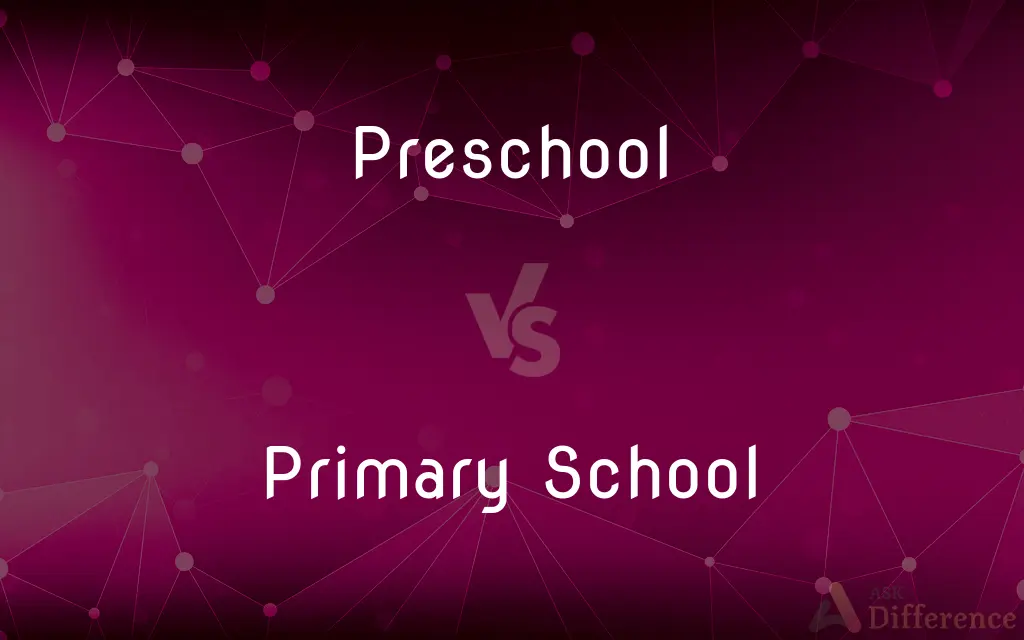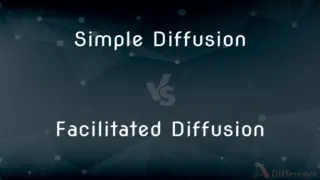Preschool vs. Primary School — What's the Difference?
Edited by Tayyaba Rehman — By Fiza Rafique — Published on December 22, 2023
Preschool is an early childhood educational setting for children before they begin compulsory education, while primary school is the first stage of compulsory education, typically for children ages 6-11.

Difference Between Preschool and Primary School
Table of Contents
ADVERTISEMENT
Key Differences
Preschool is an educational institution or setting that is designed to educate children before they enter the formal education system. In contrast, primary school is where children typically begin their formal education journey and learn foundational academic subjects.
At preschool, children often learn through play, developing social skills, and getting acclimated to a structured environment. On the other hand, primary school introduces children to core academic subjects such as math, reading, and science, and follows a more structured curriculum.
Preschools are typically intended for younger children, usually between the ages of 3 and 5. Primary schools, in contrast, cater to older children, generally between the ages of 6 and 11, guiding them through the initial stages of compulsory education.
The focus in preschool is often on developing essential motor skills, fostering creativity, and ensuring emotional well-being. In primary school, while personal development continues, there's a stronger emphasis on academics and building foundational knowledge in various subjects.
Comparison Chart
Age Group
Typically for children aged 3-5
Usually for children aged 6-11
ADVERTISEMENT
Focus
Play-based learning, motor skills, social development
Foundational academics in subjects like math, reading, and science
Duration
Often half-day sessions or shorter
Typically full-day sessions
Compulsory
Not mandatory; preparatory for formal education
First stage of compulsory education
Curriculum
Less structured, more flexible with emphasis on play
Structured with set standards and objectives
Compare with Definitions
Preschool
Preschool prepares children for the transition to formal education.
After two years in preschool, Mia was ready for kindergarten.
Primary School
Primary school often has full-day sessions.
The primary school day starts at 8 AM and ends at 3 PM.
Preschool
Preschool is an early childhood education setting before formal schooling begins.
Emma attends a local preschool where she learns through play.
Primary School
Primary school is the first stage of compulsory education for children.
Sarah started primary school when she turned six.
Preschool
Preschool caters to younger children, usually between 3-5 years old.
Jake is four, so he started preschool this year.
Primary School
Primary school focuses on foundational academic subjects.
In primary school, students are introduced to math, science, and language arts.
Preschool
Preschool often has shorter, flexible sessions compared to primary school.
Leo's preschool runs every day from 9 AM to noon.
Primary School
Primary school follows a structured curriculum with set educational standards.
The primary school curriculum is designed to ensure children grasp essential academic concepts.
Preschool
Preschool focuses on play-based learning and social development.
The preschool emphasizes interactive activities to foster children's growth.
Primary School
Primary school typically serves children between the ages of 6 and 11.
The local primary school has grades from 1st to 5th.
Preschool
Of, relating to, intended for, or being the early years of childhood that precede the beginning of elementary school.
Preschool
A school for children who are not old enough to attend kindergarten; a nursery school.
Preschool
Of or relating to the years of early childhood before attendance at primary school.
Preschool
A nursery school.
Preschool
(transitive) To provide nursery school education for.
Preschool
(intransitive) To undergo nursery school education.
Preschool
An educational institution for children too young for elementary school
Common Curiosities
What's the main focus of primary school?
Primary school focuses on foundational academic subjects and personal development.
Is preschool compulsory?
No, preschool is not compulsory; it's preparatory for formal education.
How do preschool teachers differ from primary school teachers in their training?
Preschool teachers often specialize in early childhood education, while primary school teachers are trained for foundational academic teaching.
At what age do children usually start primary school?
Children typically start primary school around age 6.
What age group does preschool typically cater to?
Preschool generally serves children aged 3-5.
Do all children attend preschool before primary school?
Not necessarily; while many do, attending preschool isn't mandatory.
How long is a typical preschool day?
Preschool often has shorter sessions, possibly half-day or even shorter.
How are students assessed in primary school?
Primary school students are usually assessed through tests, quizzes, projects, and class participation.
How does the learning approach differ between preschool and primary school?
Preschool emphasizes play-based learning, while primary school introduces structured academic lessons.
What subjects are taught in primary school?
Primary school covers subjects like math, reading, science, social studies, and more.
What's the role of parents in preschool?
Parents are often more involved in preschool, participating in activities and being updated on their child's progress regularly.
Is preschool beneficial for children's social development?
Yes, preschool offers children opportunities to interact with peers, fostering social skills and emotional well-being.
Is the curriculum in primary school more structured than preschool?
Yes, primary school typically follows a more structured curriculum compared to the flexible approach of preschool.
Can children skip preschool and directly join primary school?
Yes, while preschool is beneficial, it's not mandatory, and children can directly start primary school.
Do primary schools have play-based learning like preschools?
While primary schools have more structured lessons, they often incorporate elements of play-based learning, especially in the lower grades.
Share Your Discovery

Previous Comparison
Manchu Facial Features vs. Han Facial Features
Next Comparison
Simple Diffusion vs. Facilitated DiffusionAuthor Spotlight
Written by
Fiza RafiqueFiza Rafique is a skilled content writer at AskDifference.com, where she meticulously refines and enhances written pieces. Drawing from her vast editorial expertise, Fiza ensures clarity, accuracy, and precision in every article. Passionate about language, she continually seeks to elevate the quality of content for readers worldwide.
Edited by
Tayyaba RehmanTayyaba Rehman is a distinguished writer, currently serving as a primary contributor to askdifference.com. As a researcher in semantics and etymology, Tayyaba's passion for the complexity of languages and their distinctions has found a perfect home on the platform. Tayyaba delves into the intricacies of language, distinguishing between commonly confused words and phrases, thereby providing clarity for readers worldwide.












































